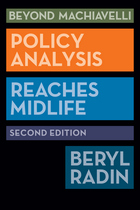
In this new edition of Beyond Machiavelli, Beryl Radin updates her popular overview of the field of policy analysis. Radin, winner of the John Gaus Award from the American Political Science Association, considers the critical issues that confront the policy analysis practitioner, changes in the field, including the globalization of policy analysis, and the dramatic changes in the policy environment. She examines schools and careers; the conflict between the imperatives of analysis and the world of politics; the analytic tools that have been used, created, or discarded over the past fifty years; the relationship between decision makers and analysts as the field has multiplied and spread; and the assumptions about the availability and appropriateness of information that can be used in the analytic task.
Once found largely in the United States, policy analysis has become global, and Radin discusses the field’s new paradigms, methodologies and concepts of success. This new edition considers changes in expertise, controversies in the field, today’s career prospects, and the impact of 9/11 on the field. She profiles three additional policy analysis organizations and updates the profiles of the organizations in the first edition. Continuing the trajectory of the fictional characters from the first edition, Radin adds a character representing the new generation just entering the field. The book discusses the shifts in society’s attitudes toward public action, the availability of resources to meet public needs, and the dimensions of policymaking.
Written for students, faculty, and practitioners, the book concludes with a look at the possible dimensions of the policy analysis field and profession as it moves into the future.

Conflict is a growth industry, as a glance at the daily paper or the nightly news tells us. Trade wars, global warming, ethnic strife, refugee crises--as the world draws closer together on a thousand fronts, trouble erupts, clashes occur, and new problems arise. What's wrong, and what can be done about it? This cogent book offers a clear approach for dealing with conflicting interests of any kind.
Roger Fisher, the world-renowned master of negotiation, with two of his leading colleagues--Elizabeth Kopelman and Andrea Kupfer Schneider--provides a step-by-step process for dealing with the persistent and complex disputes that mark our changing, often dangerous world. Instead of simply asking why things work--or don't--the authors ask: how can we affect the way things work? They break conflicts into manageable components and advance a process for problemsolving. Arguing that we need to move beyond oneshot "solutions" toward a constructive way of dealing with differences, they lay out tools for conflict analysis and practical applications for those tools in the international arena.
The authors also show that tactics which successfully influence an adversary are equally applicable to the task of persuading an employer, a community official, or a business associate. Originally drafted as a handbook for the diplomats and senior officials advised by Fisher and his colleagues, this succinct, lucid, and effective book is the primer about the new paradigm in conflict management.

READERS
Browse our collection.
PUBLISHERS
See BiblioVault's publisher services.
STUDENT SERVICES
Files for college accessibility offices.
UChicago Accessibility Resources
home | accessibility | search | about | contact us
BiblioVault ® 2001 - 2024
The University of Chicago Press









